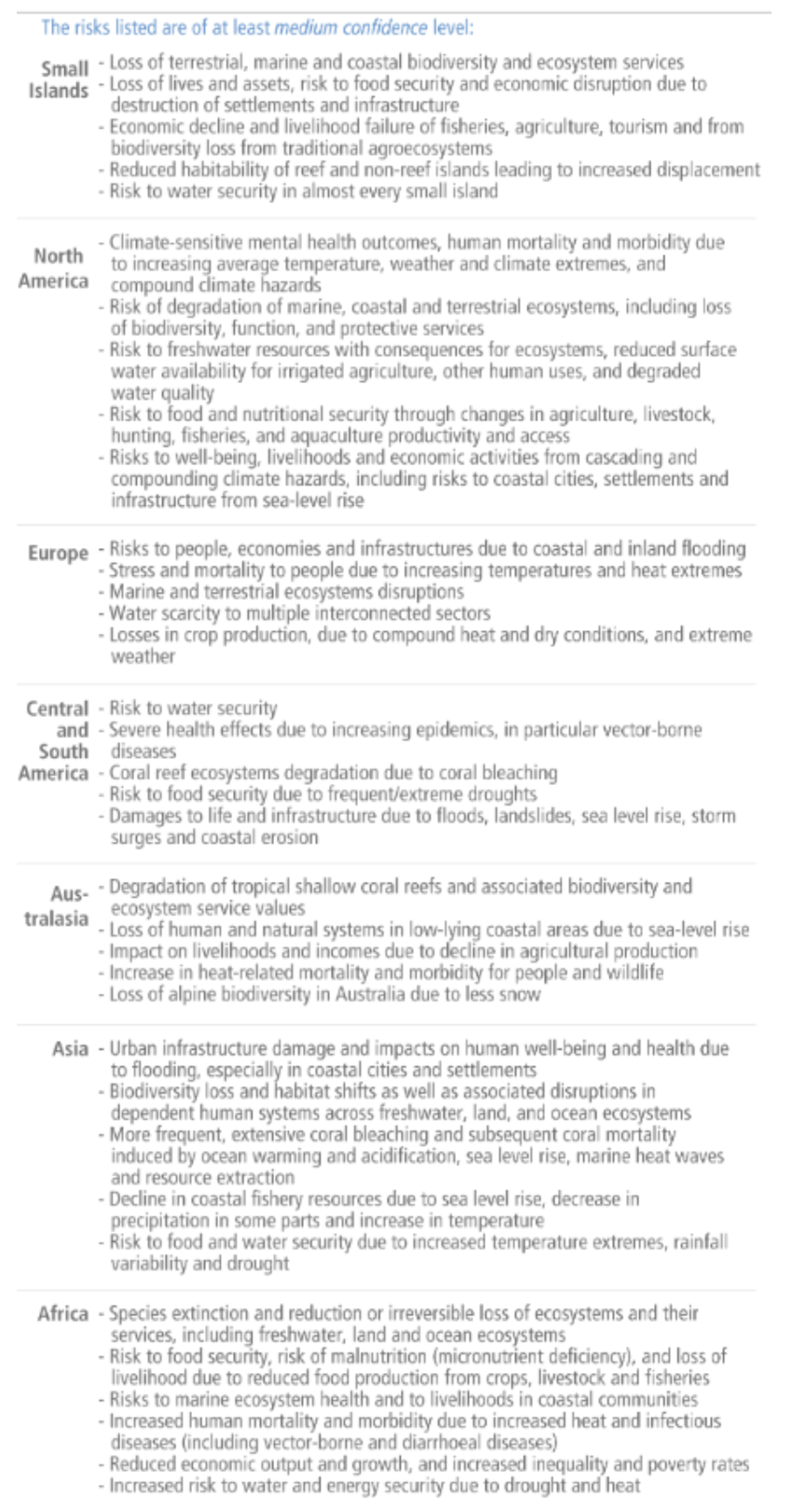Highlights
Human-induced climate change, including more frequent and intense extreme events, has caused widespread adverse impacts and related losses and damages to nature and people, beyond natural climate variability. The rise in weather and climate extremes has led to some irreversible impacts as natural and human systems are pushed beyond their ability to adapt (high confidence).
Across sectors and regions the most vulnerable people and systems are observed to be disproportionately affected. Approximately 3.3 to 3.6 billion people live in contexts that are highly vulnerable to climate change (high confidence).
Current unsustainable development patterns are increasing exposure of ecosystems and people to climate hazards (high confidence).
Global warming, reaching 1.5°C in the near-term, would cause unavoidable increases in multiple climate hazards and present multiple risks to ecosystems and humans (very high confidence). The magnitude and rate of climate change and associated risks depend strongly on near-term mitigation and adaptation actions (very high confidence).
Progress in adaptation planning and implementation has been observed across all sectors and regions, generating multiple benefits (very high confidence). However, adaptation progress is unevenly distributed with observed adaptation gaps (high confidence). Many initiatives prioritize immediate and near-term climate risk reduction which reduces the opportunity for transformational adaptation (high confidence).
There are feasible and effective adaptation options which can reduce risks to people and nature. Integrated, multi-sectoral solutions that address social inequities, differentiate responses based on climate risk and cut across systems, increase the feasibility and effectiveness of adaptation in multiple sectors (high confidence).
There is increased evidence of maladaptation across many sectors and regions. Maladaptive responses to climate change can create lock-ins of vulnerability, exposure and risks that are difficult and expensive to change and exacerbate existing inequalities.
Enabling conditions are key for implementing, accelerating and sustaining adaptation in human systems and ecosystems. These include political commitment and follow-through, institutional frameworks, policies and instruments with clear goals and priorities, enhanced knowledge on impacts and solutions, mobilization of and access to adequate financial resources, monitoring and evaluation, and inclusive governance processes (high confidence).
Climate resilient development is facilitated by international cooperation and by governments at all levels working with communities, civil society, educational bodies, scientific and other institutions, media, investors and businesses; and by developing partnerships with traditionally marginalised groups, including women, youth, Indigenous Peoples, local communities and ethnic minorities (high confidence). These partnerships are most effective when supported by enabling political leadership, institutions, resources, including finance, as well as climate services, information and decision support tools (high confidence).
The global trend of urbanisation also offers a critical opportunity in the near-term, to advance climate resilient development (high confidence). Integrated, inclusive planning and investment in everyday decision-making about urban infrastructure, including social, ecological and grey/physical infrastructures, can significantly increase the adaptive capacity of urban and rural settlements.
Safeguarding biodiversity and ecosystems is fundamental to climate resilient development, in light of the threats climate change poses to them and their roles in adaptation and mitigation (very high confidence). Recent analyses, drawing on a range of lines of evidence, suggest that maintaining the resilience of biodiversity and ecosystem services at a global scale depends on effective and equitable conservation of approximately 30% to 50% of Earth’s land, freshwater and ocean areas, including currently near-natural ecosystems (high confidence).

| Year of publication | |
| Geographic coverage | Global |
| Originally published | 01 Mar 2022 |
| Knowledge service | Metadata | Global Food and Nutrition Security
| Climate extremes and food security | Extreme weather eventVulnerability analysis Bioeconomy |
| Digital Europa Thesaurus (DET) | climate changeadaptation to climate changeClimate change mitigationVulnerable groupsRisk analysispolicymaking |
